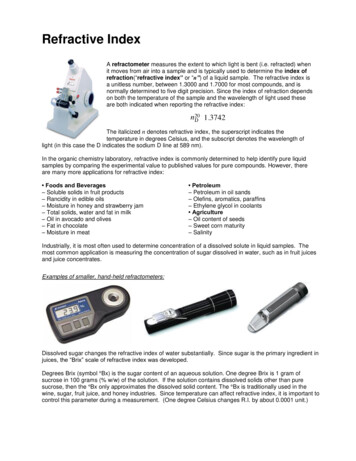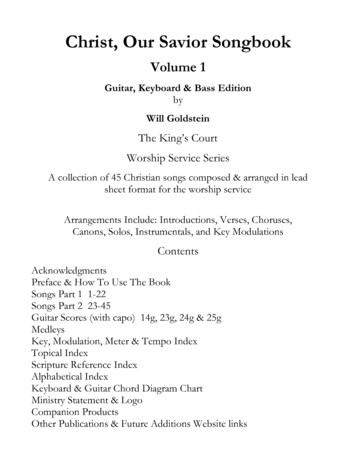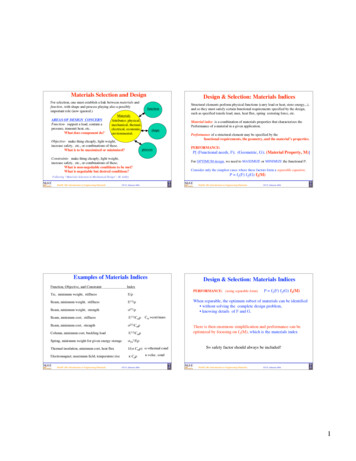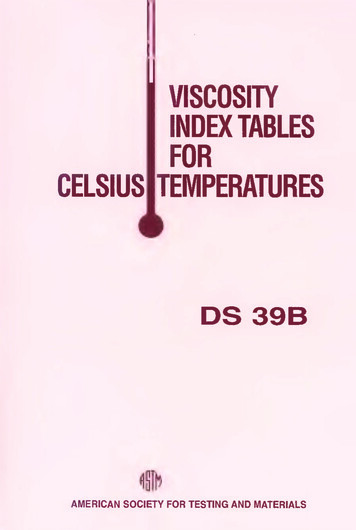![INDEX [ Breadforbeggars ]](/img/32/song-of-songs-advent-for-couples.jpg)
Transcription
INDEXAdvent 1 Devotions. 4Advent 2 Devotions. 9Advent 3 Devotions. 15Advent 4 Devotions. 21Christmas Eve & Day Devotions. 26Daily Liturgy. 28By Michael Lilienthal and Jeffrey HendrixIllustrations by Jeffrey HendrixPublished by Lutheran Synod Digital Publishing CompanyAdvent, Anno Domini 2019Unless otherwise indicated, all Scripture quotations are from The ESV Bible (The HolyBible, English Standard Version ), copyright 2001 by Crossway, a publishing ministryof Good News Publishers. Used by permission. All rights reserved.Hymns taken from Evangelical Lutheran Hymnary.2
INTRODUCTIONHOW TO USE THIS BOOKThis Advent devotional booklet isintended to be a tool to draw you andyour family further into God’s Wordduring this special season. Song ofSongs is especially fitting for marriedor engaged couples to read together.The readings for each week have beendivided into “parts’ and labeled forhusband and wife to read to each other.There are three Sundays in Adventbefore Christmas. Each reading beginson Monday, and each entire sectionis meant to be read. There are fourMondays worth of readings in thisbooklet, which will cover Advent andChristmas (even if Christmas falls onthe 4th Monday of Advent some years).During the rest of the week, there arediscussion points based on Monday’sreading.The Song of Songs is not only a poemthat Solomon is singing to his bride,known as “the Shulammite,” but itis at the same time a letter Christ isspeaking to His bride, the Church.Christ is calling her home to Him, acentral theme of Advent, as we awaitthe day Christ will return to take ushome to heaven.As you read these parts, think of thesecharacters:Note: In the business of life, especially during Advent,sometimes a devotion will get missed. That’s ok.Couples should prioritize the reading and then pick upon whatever the current day’s devotion is.As you witness the unconditional loveof Christ in Song of Songs, may yougrow in your love for each other andfor Christ.Husband (Groom) – Solomon – ChristThe different types of imagery arevariously designated in the footnotes:Wife (Bride) – Solomon’s beloved, the Shulammite –Christ’s beloved, the ChurchV - Visual (Sight)Both – “Others”: family members or women inJerusalem – members of the Church (or, sometimes,those outside the church)A - Auditory (Sound)F - FeelP - PostureS - SmellG - Geographical (social context; general)T - Taste3
First ReadingADVENT 1 MONDAY – SONG OF SONGS 1:1-16The first Advent candle (violet) is lit.Hymn verses this week: “The Bridegroom Soon Will Call Us,” vv. 1, 21 The Song of Songs, which is Solomon’sMarital Bliss2Wife:Let him kiss me with the kisses of his mouth! Foryour love is better than wine; 3your anointing oils are fragrant;your name is oil poured out; therefore virgins love you. 4Drawme after you; let us run. The king has brought me into hischambers.Both:We will exult and rejoice in you; we will extol yourlove more than wine; rightly do they love you.Courtship5Wife:I am very dark, but lovely, O daughters of Jerusalem,like the tents of Kedar, like the curtains of Solomon. 6Do notgaze at me because I am dark, because the sun has looked uponme. My mother’s sons were angry with me; they made mekeeper of the vineyards, but my own vineyard I have not kept!7Tell me, you whom my soul loves, where you pasture yourflock, where you make it lie down at noon; for why should I belike one who veils herself beside the flocks of your companions?Husband: 8If you do not know, O most beautiful among women,follow in the tracks of the flock, and pasture your young goatsbeside the shepherds’ tents.WeddingHusband: 9I compare you, my love, to a mare among Pharaoh’schariots. 10Your cheeks are lovely with ornaments, your neckwith strings of jewels.11Both:We will make for you ornaments of gold, studdedwith silver.4
Advent 1Marital Bliss12Wife:While the king was on his couch, my nard gave forthits fragrance. 13My beloved is to me a sachet of myrrh that liesbetween my breasts. 14My beloved is to me a cluster of hennablossomsa in the vineyards of Engedi.bHusband: 15Behold, you are beautiful, my love; behold, you arebeautiful; your eyes are doves.16Wife:Behold, you are beautiful, my beloved, trulydelightful. Our couch is green; 17the beams of our house arecedar; our rafters are pine.aS - Nard smells musky, rich, sweet, and earthy. Myrrh smells clean, warm, andlightly spicy, perhaps a hint of black licorice. Henna blossoms smell floral (like roses), withintriguing mixes of earthy scents like chocolate and tobacco.bG - Engedi: An oasis city on the west of the Salt Sea, where Solomon had rich vineyardsand gardens, also known for its production of incense.ADVENT 1 TUESDAY – SONG. 1:2-4Wine: Wine is a provider of joy, and one can imagine the king’swine being the best around. But love - the love described here - isbetter.Jesus’ first miracle was turning water into wine at a weddingbanquet (John 1:1-11). It was the best wine they had tasted.What does this say about how Jesus values marriage?Where do we commonly find wine in our Chrisitanworship?The Lord’s Supper is an anticipation of the eternal wedding feast.In the Sacrament, we have a little taste of heaven, because whenJesus gives us his body and blood, He gives us forgiveness of sins,eternal life, and salvation. He joins us to himself in marriage.Oil: Kings and priests were anointed with sweet-smelling oilin the Old Testament, and brides were anointed as well. When thebride of a king is anointed, the oil she receives is a wedding gift ofthe highest order, because it symbolizes the lifelong union of thisman and wife, and he also gives her his royal dignity and honor.Traditionally, a wife takes her husband’s name uponmarriage. The oil in the Song symbolizes the king’sname poured onto the bride. When was God’s name5
poured out onto each of us? Where do we get regularreminders of this?Jesus, our prophet, priest, and king, was anointed in his Baptism,and again by the sinful woman (Matthew 26:7). This also markedhim as the sacrifice for our sins. He came in order to lay down hislife. When he comes again, it will be to take us to the unity withGod his sacrifice won.ADVENT 1 WEDNESDAY – SONG. 1:5-8Dark: Solomon’s bride was apparently engaged in difficultmanual labor in the sun. She would therefore have been of lowereconomic and social status. Is such a peasant a worthy bride for aking? But her beauty is not determined by her appearance by thelove of her husband.How is your relationship as pleasant as this Song describes?How has sin showed itself in your relationship? Howdoes God’s love overshadow all that sin has corrupted inyour marriage relationship?We, the Church, are the bride of Christ, who, by being “baptizedinto Christ have put on Christ” (Galatians 3:27). We are beautifuland holy because Jesus came to be the perfect human being, andhe comes into our hearts through Word and Sacrament to make usholy in his image.Tents: The shepherds of Kedar lived in tents of darkened animalhide. Before they settled in the Promised Land, the people of Israelalso dwelt in tents, and they were led by their Good Shepherd, wholived in the greatest tent: the Tabernacle. When God came amonghis people according to promise, the apostle John writes that “theWord became flesh and tentedc among us” (John 1:14, EHV). Hewrapped himself in humble human flesh when he came to save us.Now we are still shepherded by pastors (Latin for shepherds), whogive the Word of our Savior to us. This began when the firstpeople to receive the news of the Savior’s birth were shepherds inthe fields, keeping watch over their flocks by night. They joyfullyshared the good news that we have received and may also share.Why do we take comfort in knowing that Jesus “tentedwith us”?6cFootnote translation in EHV.
Advent 1ADVENT 1 THURSDAY – SONG. 1:9-11Mare: Pharaoh’s army was impressive, with a strong cavalry ofhorse-drawn chariots. The Bridegroom sees his bride with thesame magnificence as one of those warrior creatures, with thesame strength and power and victory. 1 John 5:4: “For everyonewho has been born of God overcomes the world. And this is thevictory that has overcome the world - our faith.”Why does our heavenly Bridegroom see us as having such avictory?When we think of Pharaoh’s chariots in biblical history, we usuallythink of the Exodus and the crossing of the Red Sea. Througha miracle, God brought his people to safety from their enemies,drawing them out of slavery to freedom. In Jesus’ resurrection, hebroke the bonds of our slavery to death, to bring us to the freedomof his eternal life.Jewels: Coupled with the power of the mare, the Bridegroomsees a glorious beauty in his bride. This country bumpkin isclothed with the king’s riches. Revelation 21:2: “And I saw theholy city, new Jerusalem, coming down out of heaven from God,prepared as a bride adorned for her husband.” Ephesians 5:2527: “Christ loved the church and gave himself up for her, that hemight sanctify her, having cleansed her by the washing of the waterwith the word, so that he might present the church to himself insplendor.” Galatians 3:27: “For as many of you as were baptizedinto Christ have put on Christ.”How does Jesus come to bring us to himself in our livesnow? How should Christ’s view of us affect how we viewour spouse?Listen: The Advent hymn “Lo! He Comes with Clouds Descending” (ELH 98)ADVENT 1 FRIDAY – SONG. 1:12-14Spices: In Scripture, spices are frequently symbolic of God’spresence with his people. The sense of smell is powerful formemory. The smell of a certain cookie can take you back to yourgrandmother’s house. The musk of old wood can transport you toyour childhood Sunday School classroom. The spices here wereused in the Temple sacrifices, to let the people know that their7
offerings were pleasing to God, taken in their place for their sins.Smelling these spices, people could remain at peace, knowing thatGod’s wrath was turned aside from them.Are there pleasing smells that you associate with churchor worship? What about with your spouse?When Jesus came, he became the perfect sacrifice forour sins. Why is it important to know that Jesus “gavehimself up for us, a fragrant offering and sacrifice toGod” (Ephesians 5:2)?The bride in the song wears the scents of her Bridegroom. Howare we, the Bride of Christ, “the aroma of Christ to God amongthose who are being saved and among those who are perishing, toone a fragrance from death to death, to the other a fragrance fromlife to life” (2 Corinthians 2:15-16)?ADVENT 1 SATURDAY – SONG. 1:15-17Beauty: The Bridegroom pronounces his love beautiful, and inresponse, she may describe his beauty as her delight. God “hasblessed us in the Beloved.so that we who were the first to hopein Christ might be to the praise of his glory” (Ephesians 1:6, 12).“In this is love, not that we have loved God but that he loved usand sent his Son to be the propitiation for our sins. Beloved, ifGod so loved us, we also ought to love one another” (1 John 4:10,11).How has God pronounced you beautiful in his sight?How may you praise God in response in your marriage?in your life?Trees: Green is the color of life, and the color of grass, on whichthe wedded couple might be lying. The beams of Solomon’spalace were made of cedar, as were those of the Temple. Thebride and groom may enjoy all God’s creation in the naturalworld. They also dwell together in the magnificent home whichthe groom has prepared for his bride. They are also permittedto enter the sanctuary of God, where he meets his people withforgiveness and life.When our heavenly Bridegroom comes in his finalAdvent, he will take us to heaven. How is our eternallife like a garden? like a palace? like the Temple?8
Second ReadingADVENT 2 MONDAY – SONG OF SONGS 2:1-4:7The first and second Advent candles (both violet) are lit.Hymn verses this week: “The Bridegroom Soon Will Call Us,” vv. 3, 6Wedding - Marital BlissWife:2 I am a rose of Sharon, a lily of the valleys.Husband: 2As a lily among brambles, so is my love among theyoung women.3Wife:As an apple tree among the trees of the forest, so ismy beloved among the young men. With great delight I sat inhis shadow, and his fruit was sweet to my taste. 4He broughtme to the banqueting house, and his banner over me was love.5Sustain me with raisins; refresh me with apples, for I am sickwith love. 6His left hand is under my head, and his right handembraces me! 7I adjure you, O daughters of Jerusalem, by thegazelles or the does of the field, that you not stir up or awakenlove until it pleases.Courtship8Wife:The voice of my beloved! Behold, he comes, leapingover the mountains, bounding over the hills. 9My beloved islike a gazelle or a young stag. Behold, there he stands behindour wall, gazing through the windows, looking through thelattice. 10My beloved speaks and says to me:Husband: “Arise, my love, my beautiful one, and come away,11for behold, the winter is past; the rain is over and gone. 12Theflowers appear on the earth, the time of singing has come, andthe voice of the turtledove is heard in our land. 13The fig treeripens its figs, and the vines are in blossom; they give forthfragrance. Arise, my love, my beautiful one, and come away.14O my dove, in the clefts of the rock, in the crannies of thecliff, let me see your face, let me hear your voice, for yourvoice is sweet, and your face is lovely. 15Catch the foxes for us,9
the little foxes that spoil the vineyards, for our vineyards are inblossom.”Wedding16Wife:My beloved is mine, and I am his; he grazes amongthe lilies.Marital Bliss17Wife:Until the day breathes and the shadows flee, turn, mybeloved, be like a gazelle or a young stag on cleft mountains.CourtshipWife:3 On my bed by night I sought him whom my soulloves; I sought him, but found him not. 2I will rise now and goabout the city, in the streets and in the squares; I will seek himwhom my soul loves. I sought him, but found him not. 3Thewatchmen found me as they went about the city. “Have youseen him whom my soul loves?”d 4Scarcely had I passed themwhen I found him whom my soul loves. I held him and wouldnot let him go until I had brought him into my mother’s house,and into the chamber of her who conceived me.e 5I adjure you,O daughters of Jerusalem, by the gazelles or the does of thefield, that you not stir up or awaken love until it pleases.Wedding6Wife:What is that coming up from the wilderness likecolumns of smoke, perfumed with myrrh and frankincense,with all the fragrant powders of a merchant? 7Behold, it isthe litterf of Solomon! Around it are sixty mighty men, someof the mighty men of Israel, 8all of them wearing swords andexpert in war, each with his sword at his thigh, against terrorby night. 9King Solomon made himself a carriage from thewood of Lebanon. 10He made its posts of silver, its back ofgold, its seat of purple; its interior was inlaid with love by thedaughters of Jerusalem. 11Go out, O daughters of Zion, andlook upon King Solomon, with the crown with which hismother crowned him on the day of his wedding, on the day ofthe gladness of his heart.dG - Watchmen: The night guards who seek to keep the city safe - the country bumpkinruns into them and in desperation asks them to point her to her beloved. The protectors of thecity are reminiscent of pastors, who ensure the safety of the people of God and continuallypoint them to Christ.eCf. Gen. 24:67: Isaac brings Rebekah into his mother’s tent to seal their marriage. Theblessing of the mother is a necessary feature in biblical marriage. This marriage replaces thefamily of origin (Gen. 2:24), but honors the father and mother who brought the bride into theworld.fV - The couch on which servants carry a king [ESV note]10
Advent 2Marital BlissHusband: 4 Behold, you are beautiful, my love, behold, you arebeautiful! Your eyes are doves behind your veil. Your hair islike a flock of goats leaping down the slopes of Gilead.g 2Yourteeth are like a flock of shorn ewes that have come up fromthe washing, all of which bear twins, and not one among themhas lost its young.h 3Your lips are like a scarlet thread,i and yourmouth is lovely. Your cheeks are like halves of a pomegranatejbehind your veil. 4Your neck is like the tower of David, built inrows of stone; on it hang a thousand shields, all of them shieldsof warriors.k 5Your two breasts are like two fawns, twins of agazelle, that graze among the lilies.l 6Until the day breathes andthe shadows flee, I will go away to the mountain of myrrh andthe hill of frankincense. 7You are altogether beautiful, my love;there is no flaw in you.gV - Goats, and N.B. the action and motion: A pastoral image; goats are animals thatare cared for by a shepherd.h V - Ewes with twins: Again, a pastoral image, depicting the clean white sheep. They arewashed, leading to perfection, a figure of Baptism. The fertility of the ewes depict the fruitsof faith that comes from Baptism, etc. That this is in the mouth might indicate the fruit of awitness to the truth, declaring God’s Word boldly because it has justified a person (cf. 2 Cor.4:13). (Also, 2 in the Bible frequently depicts the Word of God, i.e. Law & Gospel, 2 Tabletsof testimony, etc.)iV - Scarlet thread: Such a thread is often used as a signal in Scripture: marking thefirstborn among twins (Gen. 38:27-30), marking Rahab as safe from the destruction ofJericho (Josh. 2:18), etc. It is used in the decor of the temple and tabernacle and priestlyvestments as well. Scarlet is also the color of blood. In lips, this designates rich life, as theWord of life has been put into the mouth of the Church, and the blood of Christ touches ourlips to give us his forgiveness and life.jV - Pomegranate: A richly sweet fruit, usually designating, in Scripture, blessing,prosperity, fertility, and fruitfulness. The lovely appearance of the bride shows herblessedness.kV - The tower of David: David’s majestic tower is thought of, the tower of a warriorking, strong and smooth.lV - Fawns: Delicate, innocent animals full of life, that also dwell in the wildernesswith gazelles and stags. The bride’s fertility is related to the bridegroom. Notice that thebridegroom describes his bride from the top down: eyes, hair, teeth, lips, mouth, cheeks, neck,breasts. Later after the marriage, he will describe her from the bottom up, conotating a level ofintimacy reserved for this estate.11
ADVENT 2 TUESDAY – SONG. 2:1-2Rose: The “Rose of Sharon” has traditionally been used as animage of the Virgin Mary, who bore and gave birth to God’s Son;it is also an image of the Church.Why might a rose be a picture of the Church?When the angel Gabriel announced God’s Word to Mary that shewould be the mother of God, she believed the angel’s words andso received Jesus in her womb as “conceived by the Holy Spirit.”When we hear God’s Word, what (or whom) do wereceive?Through Christ, we who were “thorny” become lovely.Listen: The medieval hymn “Lo, How a Rose E’er Blooming” (“Behold, a Branch isGrowing” ELH 121, CW 47) associates the Rose of Sharon with Christ Himself.ADVENT 2 WEDNESDAY – SONG. 2:3-4Tree: The Church is called a rose. The beloved (Christ) iscalled an Apple Tree. Jesus calls Himself the Tree of Life in theNew Testament (cf. Luke 13:18–19 & Revelation 22:1-2). Godattached His Word of promise to the original Tree of Life in theGarden of Eden, granting eternal life through its fruit.How does Jesus give us His ‘fruit’ today?Banquet: A theme of Advent is a longing for the banquet ofheaven. Even now Christ brings a preview of this banquet to us.To what banquet does Jesus invite us to each Sunday?Does the bride’s love for her groom in the Song inspireyou to attend the banquet of your Groom, the Lord’sSupper more?Whenever we take the Lord’s Supper, we pray that it may “increaseour love for one another” – consider how sharing this cup maybring you closer to Christ and closer to each other.Listen: “Jesus Christ the Apple Tree” is a Christmas carol that is based on Song 2:3.ADVENT 2 THURSDAY – SONG. 2:10-15Spring: Spring has come–that means the wedding is drawingnear! Solomon personally invites his bride to begin a new life withhim (This is unique–grooms would often send a representative12
Advent 2to go in their place). Advent reminds us that Christ Himself willagain come soon to draw us to His home. Each day we get closerto the consummation of the marriage.In this Song, springtime brings with it the responsibility of pruningbranches so they will produce more fruit.In what ways does God “prune” you as a branch so thatyou bear more fruit (love & good works)? Are there waysyou can bear more fruit in your marriage? (cf. John 15:410) How can you “stir up one another to love.all themore as you see the Day approaching”? (Heb. 10:24, 25)Listen: “Rise Up My Love, My Fair One” by Healey Willan (1880-1968) is an Advent carolbased on these verses.ADVENT 2 FRIDAY – SONG. 2:16-3:11Search: The bride pictures her groom on a bed of lilies – in joyand perfection. She tries to find him through her own thoughtsand thoughts, but is unable to. Finally, after the watchmen find her,she sees her bridegroom. He is coming in a pageant through thetown to come and get his bride, to bring her out of the wilderness.He is perfumed with myrrh and frankincense.This all is a preview of how Christ comes to bring His Churchout of the wilderness of this world. He has redeemed us not withgold or silver, but with His holy precious blood. He will return inall His glory to bring us home.The myrrh and frankincense remind us of the wise men whocame to offer their gifts to the Christ child. Recall that whilethe wise men followed the star, they couldn’t locate the Childmerely with the star. They had to go to the priests at the templeto search the Scriptures to see where the Christ would be born (cf.Matthew 2:1-5). Christ has promised He would be found in HisWord, not through thoughts, feelings, or even supernatural events.Are you ever tempted to look for Christ where He hasn’tpromised to be? Are you ever tempted to view yourspouse as something they are not?Listen: J.S. Bach’s BWV 140 (Wachet auf), especially both Recitatives and Aries (Duets).The most famous of Lutheran composers, Bach weaves together imagery from Song of Songsin with the parable of the wedding banquet (or Ten Virgins) from Matthew 25, as well as thewedding bliss of the heavenly Jerusalem from Revelation. The chorale (hymn) is often usedAdvent in the Lutheran Church (“Wake, Awake” ELH 544 / CW 206).13
ADVENT 2 SATURDAY – SONG. 4:1-7Beauty: The Bridegroom describes his bride’s eyes, hair, teeth,lips, cheeks, neck, and breasts, and together the picture of doves,goats, freshly washed ewes with twins, a scarlet thread, halves of apomegranate, the tower of David, and twin fawns among the liliespresents peace, perfection, power, and beauty.What makes our heavenly Bridegroom see us with such adescription? (Think of where you see doves elsewhere inthe Bible. And where else do you see goats and lambs?)How can you continue to see your spouse in such a way?Mountain: The Bridegroom has gone away to a mountain,specifically, the mountain that smells of the spices that ascend tothe throne of God.To what mountain has our Bridegroom ascended?Where do we continue to go to be reminded of his loveand to await his return? What do you do as a coupleto continue to remind one another of your love anddevotion?Until: The Bridegroom is absent, but describes the time whenhe will return. He announces it as a specific day: a Day that“breathes.” On that day, too, “the shadows flee.” Genesis 2:7 “The LORD God formed the man of dust from the ground andbreathed into his nostrils the breath of life, and the man becamea living creature.” Psalm 23:4 - “Even though I walk through thevalley of the shadow of death, I will fear no evil, for you are withme; your rod and your staff, they comfort me.”What will occur on the Day the Groom returns for us?(cf. 1 Corinthians 15:20-26)Listen: Prayers from the Office of Compline (See the final prayer on pg. 139 in CW). Thephrase from Song of Songs, “until the day lengthens and the shadows flee” has been used in aform for nightly evening prayer in this ancient service from the 6th century.14
Third ReadingADVENT 3 MONDAY – SONG OF SONGS 4:8-6:10The third Advent candle (rose), along with two violet candles, are lit.Hymn verse this week: “The Bridegroom Soon Will Call Us,” v. 4Marital BlissHusband: 8Come with me from Lebanon, my bride; come withme from Lebanon. Depart from the peak of Amana, from thepeak of Senir and Hermon, from the dens of lions, from themountains of leopards. 9You have captivated my heart, my[beloved] sister [in Christ, as though we are one blood], mybride; you have captivated my heart with one glance of youreyes, with one jewel of your necklace. 10How beautiful is yourlove, my sister, my bride! How much better your love is thanwine, and the fragrance of your oils than any spice! 11Your lipsdrip nectar, my bride; honey and milk are under your tongue;the fragrance of your garments is like the fragrance of Lebanon.12A gardenm locked is my sister, my bride, a spring locked, afountain sealed. 13Your shoots are an orchard of pomegranateswith all choicest fruits, henna with nard, 14nard and saffron,calamus and cinnamon, with all trees of frankincense, myrrhand aloes, with all choice spices - 15a garden fountain, a well ofliving water, and flowing streams from Lebanon. 16Awake, Onorth wind, and come, O south wind! Blow upon my garden,let its spices flow.Wife:Let my beloved come to his garden, and eat its choicestfruits.Husband: 5 I came to my garden, my sister, my bride, I gatheredmy myrrh with my spice, I ate my honeycomb with my honey,I drank my wine with my milk.m V/G - Garden: The garden metaphor goes on for a while. “Locked garden” Vividdescription of her premarital virginity and chastity. Luther says this description is indicativeof the Church’s being sealed and set apart from all others by God’s gifts of “Word, Baptism,and the Sacrament of the Altar” (AE 15:234). Picture also the Garden of Eden, a paradisewithout compare. The Church, by Jesus’ cleansing, becomes just such a perfect place.15
Both:Eat, friends, drink, and be drunk with love!Nightmare: Searching2Wife:I slept, but my heart was awake. A sound! My belovedis knocking.Husband: “Open to me, my sister, my love, my dove, my perfectone, for my head is wet with dew, my locks with the drops ofthe night.”3Wife:I had put off my garment; how could I put it on? Ihad bathed my feet; how could I soil them? 4My beloved puthis hand to the latch, and my heart was thrilled within me.5I arose to open to my beloved, and my hands dripped withmyrrh, my fingers with liquid myrrh, on the handles of thebolt. 6I opened to my beloved, but my beloved had turnedand gone. My soul failed me when he spoke. I sought him,but found him not; I called him, but he gave no answer. 7Thewatchmen found me as they went about in the city; they beatme, they bruised me, they took away my veil, those watchmenof the walls. 8I adjure you, O daughters of Jerusalem, if you findmy beloved, that you tell him I am sick with love.Praise9Both:What is your beloved more than another beloved, Omost beautiful among women? What is your beloved morethan another beloved, that you thus adjure us?10Wife:My beloved is radiant and ruddy, distinguishedamong ten thousand. 11His head is the finest gold; his locks arewavy, black as a raven. 12His eyes are like doves beside streamsof water, bathed in milk, sitting beside a full pool.n 13His cheeksare like beds of spices, mounds of sweet-smelling herbs.o Hislips are lilies, dripping liquid myrrh. 14His arms are rods ofgold, set with jewels. His body is polished ivory, bedecked withsapphires. 15His legs are alabaster columns, set on bases of gold.His appearance is like Lebanon, choice as the cedars. 16Hismouth is most sweet, and he is altogether desirable. This is mybeloved and this is my friend, O daughters of Jerusalem.Garden ConversationBoth:6 Where has your beloved gone, O most beautifulamong women? Where has your beloved turned, that we mayseek him with you?16nV - Gold: possibly referring to a crown. Raven: A smooth, rich black in color, and onemight think of the first bird that Noah sent out (Gen. 8:7), and of the animals that cared forthe prophet Elijah (1 Kings 17:6). This is especially potent when combined with the imageof his eyes: Doves: The Bride’s eyes were described as doves earlier, but now they apply tothe King. But in his case, it is more vivid: they are milky white, and they are beside streamsand a full pool - doves connected to water (Baptism?). The peace and purity this animalrepresents clearly comes from the Bridegroom.oS - That his cheeks smell of these spices imply that her face is close enough to his tosmell. Posture plays a role here.
Advent 3Wife:My beloved has gone down to his garden to the bedsof spices, to graze in the gardens and to gather lilies. 3I am mybeloved’s and my beloved is mine; he grazes among the lilies.Husband: 4You are beautiful as Tirzah,p my love, lovely asJerusalem,q awesome as an army with banners. 5Turn awayyour eyes from me, for they overwhelm me - Your hair is like aflock of goats leaping down the slopes of Gilead. 6Your teethare like a flock of ewes that have come up from the washing;all of them bear twins; not one among them has lost its young.7Your cheeks are like halves of a pomegranate behind your veil.8There are sixty
5 Marital Bliss Wife: 12While the king was on his couch, my nard gave forth its fragrance. 13My beloved is to me a sachet of myrrh that lies between my breasts. 14My beloved is to me a cluster of henna blossoms a in the vineyards of Engedi. b Husband: 15Behold, you are beautiful, my love; behold, you are beautiful; your eyes are doves. Wife: 16Behold, you are beautiful, my beloved, truly










